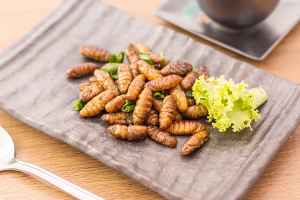Insects are a source of protein, vitamins, minerals and healthy fats
By Eva Briggs

While my daughter was an exchange student in Ecuador, she wrote home about a trip to the jungle where she had the opportunity to eat several types of insects.
She happily reported that she was one of only two students brave enough to try living giant beetle larvae.
As strange as that sounds, many cultures throughout the world regularly consume insects, such as caterpillars, grasshoppers, crickets, cicadas and mealworms.
In Zambia, flying termites are an oily crunchy snack that has been likened to popcorn.
But are insects good for you?
A recent study examined the health effects of eating crickets. That study suggests a benefit to the human microbiome — the collection of microorganisms (such as bacteria, fungi and viruses) living in or on the human body.
Here’s how the study was done. Twenty healthy adults were fed a regular diet or a diet containing 25 grams per day of cricket meal. The cricket meal was baked into muffins or mixed into shakes. After two weeks, the subjects had a two-week “washout” period of their usual diet. Then to subjects who had been eating cricket meal were switched to an insect-free diet, and those who had eaten a typical diet were fed the cricket meal diet. That allowed each person to serve as his/her own control. The researches analyzed blood samples and stool samples. The study participants also answered detailed questionnaires about their gastrointestinal health.
There was no effect on the subjects’ overall gastrointestinal health. A metabolic enzyme associated with gut health increased. There was a decrease in an inflammatory protein in the blood called TNF-alpha, which has been linked to other measures of well being, like depression and cancer.
Also certain beneficial gut bacteria increased, like Bifidobacterium animalis. This probiotic strain that has been linked to improved gastrointestinal function in a commercially available strain called BB-12.
Of course this is just a single short study, so it’s too soon to know whether the results will persist over time. One possible explanation for these findings is that insects contain types of fibers, such as chitin, not found in other food sources. While humans don’t digest these fibers, gut bacteria use them as a food source, so their ingestion may alter the bacteria living in the gut.
Insects are a source of protein, vitamins, minerals and healthy fats. And while most insects consumed around the world are currently wild-harvested, farming insects for food could be a sustainable way to produce protein at a lower environmental cost. Perhaps. On the other side, there is evidence that even if the cultural yuck factor is overcome, it may be that once production of edible insects is scaled up, the impact of feed, energy, processing and transportation will make bugs no more sustainable than conventional protein sources.
Eva Briggs is a medical doctor who works at two urgent care centers (Central Square and Fulton) operated by Oswego Health.

